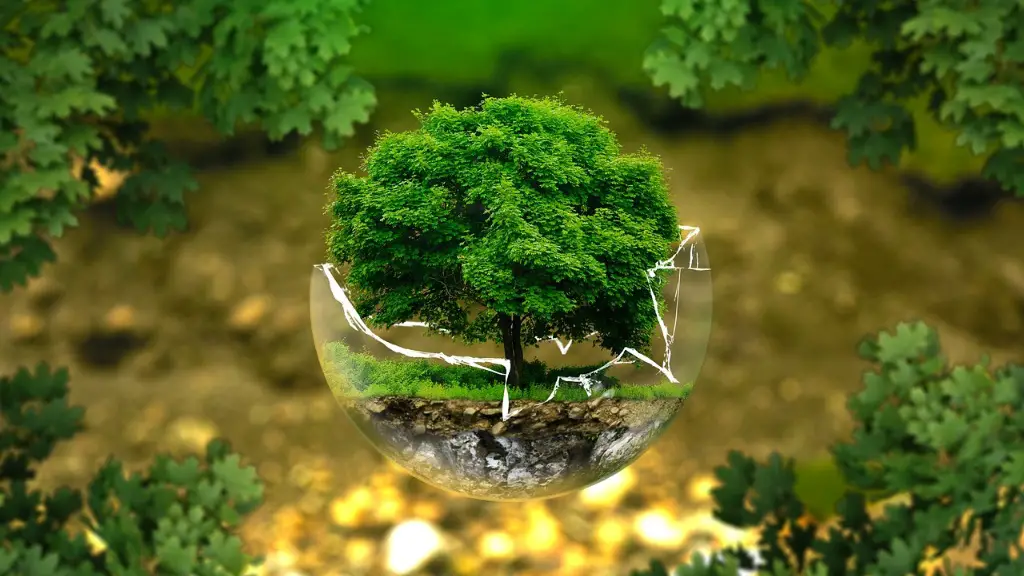Ecology is the scientific study of the interactions between organisms and their environment. It can bedefined as the branch of biology that deals with the relations of organisms to one another and to their physical surroundings. Ecology covers a wide range of topics, from the study of microscopic bacteria to the interactions of large predators.
There are many benefits of ecology, including improved environmental quality, enhanced food production, and reduced resource consumption. Ecology can also help us to better understand the natural world and our place within it.
What are the benefits we get from the ecology?
Natural areas help clean our air, purify our water, produce food and medicines, reduce chemical and noise pollution, slow floodwaters, and cool our streets. We call this work ‘ecosystem services’.
Ecosystem services are the benefits that humans receive from ecosystems. These services are often intangible, meaning they are not easily measured or valued in monetary terms.
The value of ecosystem services is often undervalued or not taken into account when making decisions about land use and development. This can lead to the loss of natural areas and the decline of the services they provide.
Protecting and restoring natural areas is essential to maintaining the ecosystem services they provide.
The five main functions of ecosystems are:
1. Purification of air and water
2. Regulation of climate
3. Detoxification and decomposition of wastes
4. Regeneration of soil fertility
5. Production and maintenance of biodiversity
These functions are essential for the continued health and wellbeing of both humans and the natural environment. Purification of air and water is vital for preventing pollution and maintaining clean air and water supplies. Regulation of climate helps to moderate weather patterns and maintain a stable climate. Detoxification and decomposition of wastes prevents the build-up of harmful toxins in the environment and helps to recycle nutrients back into the soil. Regeneration of soil fertility helps to maintain healthy soils and support plant growth. Production and maintenance of biodiversity is essential for the continued existence of many species, including humans, and for the provision of key ecosystem services.
What is ecology and why is it important
Ecology is the study of the environment, which helps us understand how organisms live with each other in unique physical environments. It includes the study of environmental factors such as light, temperature, water, soil, and their effects on plant and animal life.
Ecology is the scientific study of the distribution and abundance of living things in the physical environment. Ecology can be divided into two main subfields: population ecology and community ecology. Population ecology is concerned with the factors that affect the abundance and distribution of individual organisms within a species. Community ecology is concerned with the interactions between different species in an ecosystem.
What are 3 things about ecology?
Ecology is the study of how organisms interact with their environment. It can help us understand the negative effects of human activity on the biosphere, and reverse them.
Ecology is organized according to a hierarchy. The smallest unit is the individual organism, followed by the population, the community, the ecosystem, and finally the biosphere.
Habitats are an important concept in ecology. A habitat is the place where an organism lives, and it provides the resources that the organism needs to survive.
A related concept to habitats is the niche. A niche is the role that an organism plays in its ecosystem. It includes the resources that the organism needs, the way that it uses those resources, and the impact that it has on its environment.
Some species can build their own niches. This means that they can create their own habitats, and their populations can be self-sustaining.
Ecology is the study of how living things interact with their environment. It includes the study of how plants and animals interact with each other and with their physical surroundings, including the air, water, and soil.
Ecology is a branch of biology, but it is also relevant to many other disciplines, such as anthropology, sociology, and economics. By studying ecology, we can learn how to live more sustainably and protect the environment.
What are 3 positive effects of a healthy ecosystem?
Healthy communities rely on well-functioning ecosystems to provide clean air, fresh water, medicines and food security. They also limit disease and stabilize the climate.
The role of environmental protection is crucial in sustaining both the quality of life and economic productivity. These include the purification of air and water, detoxification and decomposition of wastes, regulation of climate, regeneration of soil fertility, and production and maintenance of biodiversity, from which key ingredients of our agricultural, pharmaceutical, and industrial enterprises are derived.
What are 4 ecosystem impacts
The Millennium Ecosystem Assessment (MA) is a major UN-sponsored effort to analyze the impact of human actions on ecosystems and human well-being. The MA has identified four major categories of ecosystem services: provisioning, regulating, cultural and supporting services.
Provisioning services are the tangible products that ecosystems provide, such as food, fuel, fresh water and timber. Regulating services are the benefits that ecosystems provide in regulating processes, such as climate, floods, droughts and disease. Cultural services are the non-material benefits that ecosystems provide, such as recreation, aesthetic value and cultural heritage. Supporting services are the benefits that ecosystems provide in supporting other ecosystem services, such as nutrient cycling and soil formation.
The MA found that many ecosystem services are in decline, and that this decline is often linked to the loss of biodiversity. The MA also found that there are significant trade-offs between different ecosystem services, and that the management of one service often comes at the expense of another. For example, the management of forests for timber production often results in the loss of other ecosystem services, such as carbon sequestration and wildlife habitat.
The MA highlights the importance of managing ecosystems for the benefit of all ecosystem services, not just a few.
Ecology is important for many reasons. It helps us understand the interdependence between people and nature, which is crucial for food production, maintaining clean air and water, and sustaining biodiversity in a changing climate. Additionally, ecology enriches our world and is crucial for human wellbeing and prosperity.
What are ecological impacts?
Ecological impact is the effect that humans and natural occurrences have on ecosystems. These changes can be beneficial or harmful to the organisms within the ecosystem. For example, if a new species is introduced to an ecosystem, it could have a negative impact on the native species. However, if a species is removed from an ecosystem, it could have a positive impact on the remaining species.
Temperature is the most ecologically relevant environmental factor because it determines the growth and development rates of plants and animals, as well as the physiological limits of organisms. Organisms have adapted to their local climate, meaning that a change in temperature can have profound effects on an ecosystem. Seasonal temperature changes also drive the cycles of ecological events such as the flowering of plants and the breeding of animals.
What do you need for ecology
In order to become an ecologist, you will need to hold a bachelor’s degree in a job related to ecology. This can include degrees such as biology, zoology, marine biology, environmental science, wildlife conservation, or botany. Additionally, you will need to have experience working in the field of ecology in order to be successful in this career.
Here are some fun facts about the environment!
-Around 27,000 trees are cut down each day
-Humans use only 1% of all available water
-78% of marine mammals are at risk of choking on plastic
-Americans throw away 25 trillion Styrofoam cups every year
-Fungi play a highly vital role in the environment
-Ants weigh more than humans
What are the two main factors of ecology?
Biotic and abiotic factors affect the environment and organisms within that environment. Biotic factors are living things that affect other organisms, while abiotic factors are non-living things that affect organisms. Some examples of biotic factors are animals, plants, fungi, bacteria, and protists. Some examples of abiotic factors are water, soil, air, sunlight, temperature, and minerals. Both biotic and abiotic factors play a role in the ecosystem and the overall health of an organism.
There are many different fields of ecology, each with a different focus. Aquatic ecology deals with the study of ecosystems found in water bodies such as estuarine, freshwater and marine. Microbial ecology looks at the relationships between microorganisms and their environment. Taxonomic ecology studies the classification and identification of organisms. Systems ecology looks at how ecosystems interact and how they change over time. Evolutionary ecology studies how species evolve and how they interact with their environment. Behavioural ecology looks at the behaviour of animals and how it affects their interactions with other organisms and their environment. Population ecology looks at how populations of organisms interact and how they change over time.
Warp Up
There are many benefits to ecology, including reducing our impact on the environment, improving our understanding of the natural world, and protecting biodiversity. Ecology can also help us to develop more sustainable ways of living and producing food, energy, and other resources.
There are many benefits to ecology, including the fact that it can help us to understand and protect the environment. It can also help us to identify potential environmental problems and find solutions to them. Additionally, ecology can help us to learn about the interconnectedness of all aspects of the natural world and how our actions can impact the environment.





